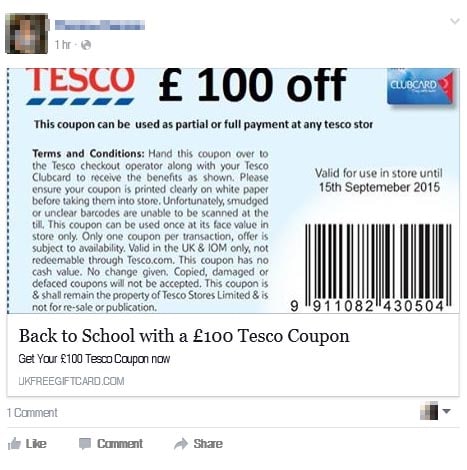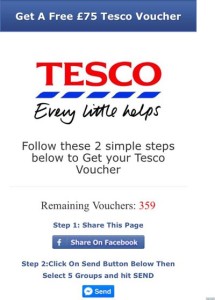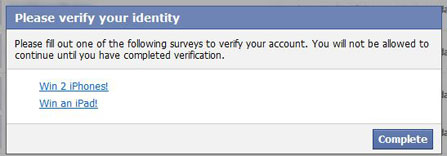Spam posts spreading across Facebook promising to give away coupons or gift certificates for popular retail brands are one of the most commonly encountered scams we see on the social networking website.
The scams are a popular variant of fake competitions or giveaways that we often see on Facebook and they work in the same way.
Firstly they implore users to like, share or comment on a Facebook post offering a free coupon for a recognisable retail brand. Many Facebook users at this point will comply using “just in case” reasoning, believing that they have nothing to lose.


In the first step, you’ll see a post asking you to share and like it.
Secondly the Facebook user is then typically instructed to click a link to visit a website in order to collect their coupon. Upon clicking that link they are taken to a webpage that asks them to share the link on their Facebook timeline (see image below.) Many versions of this scam also ask they share the link onto Facebook groups of which they are a member. Again a large number of Facebook users will comply because they think there is a chance the scheme may be legitimate and that there is nothing to lose by following these steps.


In the second step, the post will contain a link to claim your prize which goes to another page
Thirdly most of these scams then direct users to a webpage to “collect their coupon” only to find that in order to unlock the content they first must complete a survey or questionnaire. At this point many users will become suspicious and stop following the instructions. However they have already shared the scammy links on their timelines and onto groups to which they are members. Those who continue will discover that the questionnaires and surveys ask for personal information that will result in them becoming targeted with spam. And then they’ll discover that the shop coupons don’t actually exist, and it has all been for nothing.


Thirdly you’ll be told to complete surveys to unlock the free coupon
These scams may seem harmless, but in reality they’re big business for scammers and a significant problem for Facebook. So many of these scams spread across the social networking website every day that the people behind them are profiting a lot, which ultimately goes into funding more of the same scams. The scammers profit every time they lure someone into giving up their personal information via the surveys, since companies are willing to pay them for each people they refer.
Sponsored Content. Continued below...
Don’t fall for these scams just in case. Facebook’s own terms of service disallows requiring people to share links on Facebook to enter a competition or giveaway. So any “competition” that demands this is almost certainly going to be a scam.
And if you do fall for a scam and reach the third stage that asks you to complete a survey, remember you’ve shared spammy links on your Facebook profile. So pleases delete them to stop others falling for the same scam!
Thanks for reading, we hope this article helped, but before you leave us for greener pastures, please help us out.
We're hoping to be totally ad-free by 2025 - after all, no one likes online adverts, and all they do is get in the way and slow everything down. But of course we still have fees and costs to pay, so please, please consider becoming a Facebook supporter! It costs only 0.99p (~$1.30) a month (you can stop at any time) and ensures we can still keep posting Cybersecurity themed content to help keep our communities safe and scam-free. You can subscribe here
Remember, we're active on social media - so follow us on Facebook, Bluesky, Instagram and X